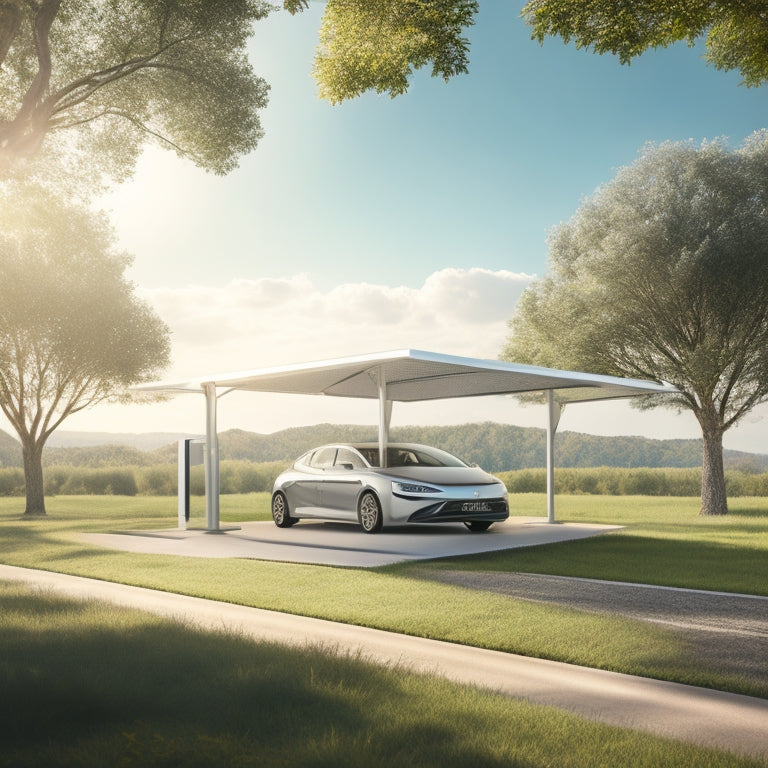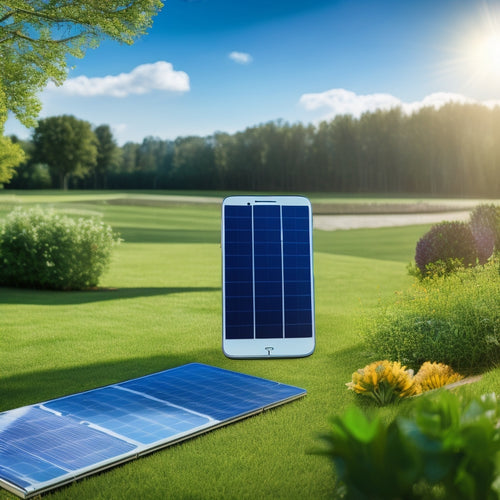
Green EV Charging: Harnessing the Sun's Power
Share
You're utilizing the sun's power to charge your electric vehicle, greatly reducing your carbon footprint and contributing to a sustainable future. By leveraging solar energy, you'll decentralize energy generation, alleviate grid strain, and enjoy energy independence. Solar incentives, like tax credits and rebates, can offset initial investment costs. As you investigate green EV charging, you'll uncover the importance of energy storage systems, efficient power conversion, and smart charging infrastructure. With the ability to optimize energy distribution and reduce reliance on fossil fuels, you'll be intrigued to learn more about the innovative solutions and future trends shaping the industry.
Key Takeaways
- Solar EV charging reduces carbon footprint, alleviating grid strain and promoting a cleaner environment through decentralized energy generation.
- Solar panels convert sunlight into electricity, which is then stored in energy storage systems for later use, minimizing reliance on fossil fuels.
- Efficient power conversion and management systems optimize energy usage, reduce energy losses, and ensure a steady electricity supply for EV charging.
- Integration of solar power and energy storage systems enables energy independence, minimizes ecological footprint, and reduces greenhouse gas emissions.
- Government incentives, tax credits, and rebates offset installation costs, making solar EV charging a financially and environmentally wise investment.
Solar EV Charging Benefits
Your electric vehicle's (EV's) reliance on fossil fuels ends with solar EV charging, which offers several benefits.
You'll reduce your carbon footprint, supporting a cleaner environment and a healthier planet. By decentralizing energy generation, you'll also alleviate strain on the grid, reducing the likelihood of blackouts and power outages during peak demand Peak Electricity Demand Reduced.
Solar incentives, such as tax credits and rebates, can offset the initial investment in solar panels, making the shift more affordable. As public awareness of climate change grows, you'll be ahead of the curve, contributing to a sustainable future.
How Solar Charging Works
You'll need to install solar panels to capture the sun's energy, which is then stored in energy storage systems like batteries.
These systems enable you to store excess energy generated during the day for later use.
The energy conversion process, involving three stages: photons excite electrons, electrons flow through an inverter, and AC power is produced sustainable option, then kicks in, converting the DC power from the solar panels and energy storage systems into AC power that's compatible with your electric vehicle.
Solar Panel Installation
Frequently, electric vehicle (EV) owners opt for solar panel installation to capture renewable energy and charge their vehicles sustainably.
When considering solar panel installation, you'll need to decide on the type of solar panels that suit your needs. There are two primary types: monocrystalline and polycrystalline. Monocrystalline panels are more efficient but pricier, while polycrystalline panels are more budget-friendly but less efficient.
It's crucial to assess your energy requirements, including all onboard systems and appliances, and perform a thorough inspection of your vehicle to verify no wear or damage affecting installation high-efficiency solar panels.
You'll also need to choose an installation technique: roof-mounted, ground-mounted, or tracking systems. Roof-mounted systems are the most common, but ground-mounted systems offer more flexibility. Tracking systems, which adjust to the sun's movement, provide maximum energy output.
Energy Storage Systems
As solar panels generate electricity, it's stored in energy storage systems to power your EV. You'll need a reliable energy storage system to guarantee a steady supply of electricity when you need it.
By mitigating peak shaving, solar power integration can reduce grid strain and demand charges reducing operational costs, allowing you to allocate resources more efficiently.
Advanced battery technologies, such as lithium-ion batteries, play an essential role in storing excess energy generated by your solar panels. These batteries can be configured to provide both grid-independent backup power and grid-tied systems, allowing you to feed excess energy back into the grid.
Effective grid integration guarantees a seamless shift between solar-generated power and grid power, providing you with the freedom to charge your EV whenever you want.
With the right energy storage system, you'll have the flexibility to manage your energy usage and reduce your reliance on the grid.
Power Conversion Process
During a typical solar charging session, one vital process unfolds: the power conversion process. You're probably wondering how the sun's energy is converted into a usable form for your electric vehicle. The answer lies in the power conversion process, which involves altering the DC power generated by the solar panels into AC power that your EV can use. This process is essential for efficient energy transfer.
By utilizing renewable energy solutions, solar-powered EV charging stations can reduce greenhouse gas emissions and provide a stable energy supply. Additionally, achieving energy independence through solar power minimizes reliance on the grid, enhancing brand reputation and attracting environmentally conscious customers.
-
The power conversion process involves an inverter, which converts DC power into AC power, ensuring a stable and efficient energy supply.
-
Efficiency optimization is key, as it minimizes energy losses and maximizes the amount of solar energy captured.
-
The power conversion process is designed to adapt to varying solar irradiance levels, ensuring a consistent energy supply even on cloudy days.
Station Design and Installation
When designing and installing a green EV charging station, you'll need to take into account solar panel integration to maximize renewable energy generation.
You'll also need to incorporate energy storage systems to stabilize the electrical output and guarantee a reliable charging experience.
Solar Panel Integration
Integrating solar panels into your EV charging station design guarantees a sustainable and renewable energy source to power your electric vehicles.
By leveraging solar technology advancements, you can reduce your reliance on the grid and minimize your carbon footprint. This integration also enables you to take advantage of renewable energy integration, ensuring a cleaner and more efficient charging experience.
Some key considerations for solar panel integration include:
- Evaluating your station's energy demands and sizing the solar array accordingly
- Selecting high-efficiency solar panels that can enhance energy production
- Ensuring proper installation and maintenance to guarantee peak performance
Energy Storage Systems
Reliability is key in the domain of electric vehicle charging, and energy storage systems play an essential part in guaranteeing a seamless and efficient charging experience.
You'll need to take into account advanced battery technologies that can store excess energy generated by your solar panels during the day for use during periods of high demand or when the sun isn't shining. This not only reduces your reliance on the grid but also enables you to optimize your energy usage.
Effective grid integration is vital to guarantee a stable and efficient flow of energy between your energy storage system, solar panels, and the electrical grid.
Efficient Charging Layout
During peak charging hours, you'll want to make certain that your EV charging station is designed to handle the increased demand efficiently. This means optimizing your charging infrastructure to minimize strain on the grid and reduce wait times.
A well-designed station can integrate seamlessly with the grid, ensuring a reliable and efficient charging experience.
Some key considerations for efficient charging layout include:
- Modular design: allowing for easy upgrades and expansion as demand grows
- Load management systems: to distribute power evenly and prevent overload
- Smart charging algorithms: to optimize charging times and reduce strain on the grid
Energy Storage and Backup
How does a green EV charging system guarantee a steady power supply when the grid is down or intermittent? It's through energy storage and backup systems that secure your electric vehicle (EV) gets the power it needs, even when the grid is unreliable.
| Technology | Description | Benefits |
|---|---|---|
| Battery Management | Advanced system to monitor and control battery performance | Optimizes energy efficiency and extends battery lifespan |
| Renewable Sources | Integration with solar, wind, and other renewable energy sources | Reduces reliance on the grid and lowers carbon footprint |
| Smart Grid Integration | Real-time monitoring and load balancing | Secures a stable power supply and minimizes strain on the grid |
Cost Savings and Incentives
By adopting a green EV charging system, you can reap significant cost savings and incentives. With a well-designed system, you can reduce your reliance on the grid and lower your electricity bills.
-
Government incentives, such as tax credits and installation grants, can help offset the initial cost of your green EV charging system.
-
A thorough cost analysis will reveal long-term savings and financial benefits, including utility rebates and a strong ROI calculation.
-
By utilizing the sun's power, you'll enjoy freedom from fluctuating energy prices and a reduced carbon footprint, making your investment a wise one.
Environmental Impact Reduction
The adoption of green EV charging systems greatly reduces your environmental impact, as they employ renewable energy sources to power your electric vehicle.
By switching to green EV charging, you'll markedly decrease your carbon footprint, contributing to a cleaner environment and mitigating climate change.
Renewable energy sources, such as solar power, replace fossil fuels, reducing greenhouse gas emissions and air pollution.
This not only benefits the environment but also enhances your freedom to travel without harming the planet.
With green EV charging, you're in control of your energy consumption, making a conscious choice to reduce your ecological footprint.
Future of Solar EV Charging
What role will solar EV charging play in the future of transportation? You'll likely see widespread adoption as renewable energy policies continue to drive growth.
With smart grid integration, solar EV charging will become a critical component of the energy infrastructure. Here's what you can expect:
-
Increased energy independence: Solar EV charging will allow you to generate your own energy, reducing reliance on the grid and giving you more control over your transportation costs.
-
Optimized energy distribution: Smart grids will optimize energy distribution, ensuring that excess energy generated by solar panels is stored and employed efficiently.
-
Accelerated EV adoption: As solar EV charging becomes more prevalent, it'll drive further adoption of electric vehicles, leading to a cleaner, more sustainable transportation sector.
Frequently Asked Questions
Can Solar EV Charging Stations Be Installed in Areas With Frequent Shade?
You think you can just plop a solar EV charging station anywhere, but let's get real, frequent shade means reduced charging efficiency. Sorry, buddy, but shaded locations just won't cut it; you'll need to find a sun-kissed spot for ideal juice.
How Do Solar EV Charging Stations Perform in Cold Weather Conditions?
You'll find that solar EV charging stations' cold weather performance is affected by temperature's impact on solar panel efficiency, which can drop by up to 10-15% in freezing conditions, but some systems are designed to adapt and maintain ideal energy output.
Are Solar EV Charging Stations Compatible With All Electric Vehicle Models?
You'll find that most solar EV charging stations are compatible with various electric vehicle models, but differences in solar panel efficiency and EV charging speed may impact performance, so it is important to check specifications before making a purchase.
Can Homeowners Install Their Own Solar EV Charging Stations?
You can install your own solar EV charging station, but consider the DIY installation complexity and cost considerations, assessing the benefits of energy independence against potential electrical and permitting obstacles.
Do Solar EV Charging Stations Require Regular Maintenance?
You'll be glad to know that solar EV charging stations require minimal maintenance, ensuring ideal solar panel efficiency; however, you'll still need to perform occasional cleaning and inspections to prevent reduced energy output, which can impact maintenance costs.
Related Posts
-

Smart Energy: Greener Homes With Connected Power Devices
You can control and optimize your energy consumption with smart energy devices, reducing your carbon footprint by up ...
-

3 Earth-Loving Furniture Tips for Energy-Smart Homes
When furnishing your energy-smart home, you have the power to reduce your carbon footprint greatly by making consciou...
-

7 Best Solar Panel Upkeep Apps for Homeowners
You can optimize your solar panel's energy output and efficiency by up to 20% with regular maintenance, which is wher...


